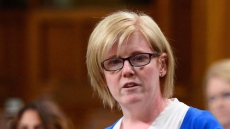Setting up lawn chairs in driveways for socially-distant neighbourhood parties. Talking to one another from apartment building balconies. Driving to parking lots to chat from cars parked two metres apart.
People have been finding innovative ways to keep socializing with friends and neighbours while trying to respect physical distancing measures during the COVID-19 outbreak.
While it may seem harmless enough, some experts say those social distancing loopholes are probably not worth the risk.
"As humans we will always find ways to kind of push limitations, to figure out how we can work around problems," microbiologist Jason Kindrachuk said in a phone interview with The Canadian Press.
"But that's where, as far as public messaging goes, we need to keep reiterating the sheer importance of social distancing, why we're doing this in the first place.
"And how many risks are we willing to take that may potentially result in spreading this virus?"
The coronavirus is transmitted by respiratory droplets, which are released into the air when infected individuals breathe, talk, sneeze or cough. The droplets will generally travel about two metres before they hit the ground, said Kindrachuk.
That means keeping a safe distance, at least two metres or six feet away from someone else, is one of the most effective methods we have for halting the spread.
Kindrachuk, who's also an assistant professor of viral pathogenesis at the University of Manitoba in Winnipeg, said maintaining a two-metre distance while trying to socialize can be easier to do in some cases — like talking to a neighbour from your backyard deck with a fence serving as a physical barrier.
When you're outside with nothing standing between you and the person you're socializing with, however, the barrier becomes much easier to blur.
"If you're on two driveways, are you actually six feet apart? Are you going to take as many precautions or are you going to start to maybe reduce some of your concerns, just out of out of basic comfort?" Kindrachuk said. "If you're in that group, are you certain that every person there is maintaining that physical distance?
"Because we're dealing with a virus that transmits invisibly, right? And potentially from people that may not be showing signs of infection."
Dr. Gerald Evans, a physician and chair of the division of infectious diseases at Queen's University in Kingston, Ont., believes some social distancing loopholes can be safe, provided distance is actually maintained.
He added that having those activities outdoors, where there's "a huge dilutional effect that disperses droplet particles," can also help in limiting the spread of the virus.
"Being inside is a different story," Evans said. "And clearly, if somebody was sick, that would be a totally different story too."
Evans said extra precautions would still need to be considered when trying to keep distant while socializing outdoors, like ensuring any object around you — a chair, cooler, drink glass — also remains two metres apart from any other person.
"What you wouldn't be able to do is share anything," Evans said. "If you were sitting in a lawn chair and you were about two or three meters from your neighbour, the droplet effect isn't there. But if you were perhaps holding a glass in your hand with some lemonade or beer in it, you certainly don't want to have that object near your neighbours because yes, those objects can also be contaminated by those droplets."
Dr. Isaac Bogoch, an infectious disease expert with the University Health Network in Toronto, said trying to find any kind of social distancing loophole isn't wise.
He said public health messages from federal, provincial and municipal officials in Canada are all aligned, and some cities across the world are now imposing fines on those not following social distancing measures.
"It is very clear what you can and can't do," Bogoch said. "You can go out for exercise and go walk the dog, but otherwise, just stay apart. Stay at home.
"Maybe it's technically not wrong, but it's certainly not in the spirit of what we should be doing."
Kindrachuk said even something like going to drop off baked goods or a home-cooked meal at a friend's doorstep could potentially be dangerous.
Keeping distant, and limiting the number of surfaces touched by multiple people, is the best approach, he said.
"I think the medical and scientific community as a whole, we want people to understand and appreciate why physical distancing is so important, especially because we don't have a vaccine," Kindrachuk said. "Our only real ability to curb transmission of this virus is by reducing its ability to spread from one person to another.
"If we want to get this completely contained, we need to do everything we can to stop the virus from being able to transmit."
Melissa Couto, The Canadian Press


